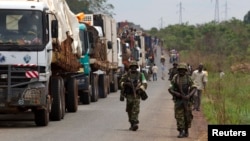BRUSSELS —
The European Union formally launched a peacekeeping force for Central African Republic on Tuesday, overcoming delays due to shortages of soldiers and equipment thanks to last-minute offers of help from EU governments.
French and African Union peacekeepers have so far failed to stop the conflict that erupted after the mostly Muslim Seleka rebels seized power a year ago in the majority Christian state.
Operating out of the capital Bangui, the force of up to 1,000 soldiers will bolster 6,000 African and 2,000 French troops struggling to stop the violence in the landlocked, impoverished country that has left thousands dead.
When the EU initially approved the mission in January, it had hoped troops would start arriving by the end of February.
At a meeting in Brussels last week, EU governments and some countries from outside the bloc offered new support for the mission in the areas of strategic airlift as well as help with deploying the force.
"The launch of this operation demonstrates the EU's determination to take full part in international efforts to restore stability and security in Bangui and right across the Central African Republic," EU foreign policy chief Catherine Ashton said in a statement.
The EU gave no details of which countries made the new offers of help.
The United Nations said on Tuesday it was trying to evacuate 19,000 Muslims urgently from Bangui and other parts of Central African Republic who are surrounded by anti-balaka Christian militia threatening their lives.
Anti-balaka forces control major routes to and from Bangui as well as many towns and villages in the southwest, the U.N. refugee agency said.
The militia has become more militarised as it steps up attacks on Muslims and African Union peacekeepers.
The goal of the EU force will be to provide security in the capital Bangui and at Bangui airport, where around 70,000 people who have fled the violence are living in dire conditions.
The EU force will stay for up to six months and cost an initial 26 million euros ($36 million), before handing over to African Union peacekeepers.
France has urged its EU partners to do more to help in its former colony, saying the EU must not shirk its responsibilities for international security.
French and African Union peacekeepers have so far failed to stop the conflict that erupted after the mostly Muslim Seleka rebels seized power a year ago in the majority Christian state.
Operating out of the capital Bangui, the force of up to 1,000 soldiers will bolster 6,000 African and 2,000 French troops struggling to stop the violence in the landlocked, impoverished country that has left thousands dead.
When the EU initially approved the mission in January, it had hoped troops would start arriving by the end of February.
At a meeting in Brussels last week, EU governments and some countries from outside the bloc offered new support for the mission in the areas of strategic airlift as well as help with deploying the force.
"The launch of this operation demonstrates the EU's determination to take full part in international efforts to restore stability and security in Bangui and right across the Central African Republic," EU foreign policy chief Catherine Ashton said in a statement.
The EU gave no details of which countries made the new offers of help.
The United Nations said on Tuesday it was trying to evacuate 19,000 Muslims urgently from Bangui and other parts of Central African Republic who are surrounded by anti-balaka Christian militia threatening their lives.
Anti-balaka forces control major routes to and from Bangui as well as many towns and villages in the southwest, the U.N. refugee agency said.
The militia has become more militarised as it steps up attacks on Muslims and African Union peacekeepers.
The goal of the EU force will be to provide security in the capital Bangui and at Bangui airport, where around 70,000 people who have fled the violence are living in dire conditions.
The EU force will stay for up to six months and cost an initial 26 million euros ($36 million), before handing over to African Union peacekeepers.
France has urged its EU partners to do more to help in its former colony, saying the EU must not shirk its responsibilities for international security.





